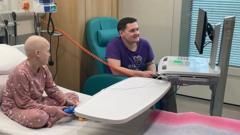
Glasgow Children’s Hospital Charity Introduces Innovative Gamer in Residence Program
In a groundbreaking approach to pediatric patient care, the Glasgow Children’s Hospital Charity has created a unique position: a gamer in residence who visits young patients to play video games and provide emotional support during their hospital stay.
Steven Mair, the newly appointed gamer, has already demonstrated the significant therapeutic potential of gaming in a hospital setting. His role goes beyond mere entertainment, offering tangible benefits to children undergoing medical treatments.
One remarkable example of gaming’s positive impact involves a patient whose hand mobility improved through playing Mario Kart. Mair has also found that video games serve as an effective distraction during medical procedures, helping children manage stress and anxiety.
During one of his first sessions, Mair played games with a patient undergoing a plasma exchange, a potentially intrusive medical procedure. By engaging the child in gameplay, he successfully kept the patient distracted throughout the entire treatment, showcasing the potential of interactive entertainment as a coping mechanism.
The program has received positive feedback from patients and their families. Josephine, mother of eight-year-old Laura Jayne, who has been hospitalized for six months, praised the initiative. She noted that gaming helps her daughter pass time and provides opportunities for social interaction with the hospital’s gaming staff.
This innovative approach recognizes the psychological challenges children face during extended hospital stays. Prolonged medical treatment can be emotionally taxing, and traditional methods of entertainment may not always effectively engage young patients.
By introducing a dedicated gamer, the hospital creates a more dynamic and supportive environment. The program acknowledges that children’s emotional and mental well-being is just as crucial as their physical treatment.
The gamer in residence role represents a modern, empathetic approach to pediatric care. It demonstrates an understanding that healing involves more than medical interventions and that psychological comfort can significantly impact a child’s recovery process.
While still a relatively new concept, this program could potentially inspire other healthcare facilities to explore similar innovative approaches to patient care. The integration of technology and interactive entertainment into medical settings offers promising possibilities for improving patient experiences.
The Glasgow Children’s Hospital Charity’s initiative highlights the evolving nature of healthcare, where patient-centered care increasingly includes strategies that address emotional and psychological needs alongside medical treatment.
As video games continue to demonstrate their potential beyond entertainment, programs like this gamer in residence role could become more common, offering children a sense of normalcy, distraction, and joy during challenging medical experiences.








